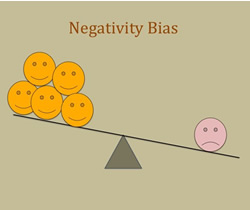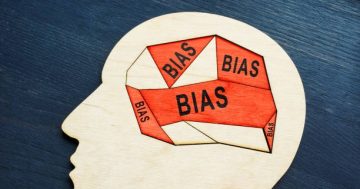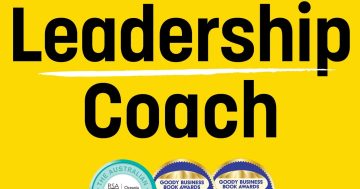Michelle Bakjac* says evolution has hard-wired our brains to take more note of negative events over positive — but we should not let it take over our lives.
 You may have heard of Negativity Bias, but what exactly is it and how do you manage it or overcome it?
You may have heard of Negativity Bias, but what exactly is it and how do you manage it or overcome it?
When you read the news, do you find yourself drawn to the more depressing articles?
As humans, we tend to be impacted much more by negative events than by positive ones.
This negativity bias can influence how we feel, think, and act, and can have some less than desirable effects on our psychological state.
Negativity Bias refers to our proclivity to attend to, learn from, and use negative information far more than positive information.
We can think of it as an ‘asymmetry’ in how we process negative and positive occurrences to understand our world.
Among other things, it can explain why we often recall and think about insults more than compliments.
It is why we respond more, emotionally and physically, to adverse stimuli, and why we dwell on unpleasant or traumatic events more than pleasant ones.
Even when we experience numerous good events in one day, negativity bias can cause us to focus on the sole ‘bad thing’ that occurred.
It can lead us to ruminate on small things, worry over having ‘made a bad impression,’ and linger on negative comments.
Where does this bias come from? Can we learn to spot examples of negativity bias in real life?
How can we avoid falling into the trap of getting caught up by the negative events that we experience?
Negativity bias is thought to be an adaptive evolutionary function.
Thousands of years ago, our ancestors were exposed to immediate environmental threats that we no longer need to worry about — predators, for example.
Being more attentive to these negative stimuli played a useful role in survival.
As we grow and society develops, this hard-wired tendency is not as useful as it once was.
If you think about it, even our primary emotions are predominantly negative.
Of the six primary emotions (anger, fear, happiness, surprise, disgust and sadness) how many are positive?
Research conducted in a 2009 paper reveals ample evidence to suggest that negative emotions last longer than positive ones.
This is likely related to learning and memory processes — the more attention we give to a stimulus or experience, the higher the likelihood that we’ll commit it to memory.
By directing more of our conscious attention toward the positive events and feelings we experience, we can begin to address the asymmetry of negativity bias.
By checking up on yourself throughout the day, you can start to recognise any thoughts that are running through your mind — both helpful and unhelpful.
You can also look at your own behaviour for a better understanding of what’s serving you and what isn’t.
What were you thinking before experiencing anger, resentment, or frustration?
How can you replace those thoughts with more positive ones?
Practicing mindfulness is one good way to become more attuned to your own emotions.
Through guided meditations, reflection, and other mindfulness interventions, you can start to observe your feelings and thoughts more objectively.
A 2011 study found an increase in positive judgments and higher levels of optimism when participants practiced mindful breathing.
When you catch yourself taking a negative view of situations, it often helps to practice cognitive restructuring by reframing the event or experience.
When you stop and take some time to ‘drink in’ a positive experience, you’re savouring it and creating memories for the future.
Building up your store of positive mental images and feelings helps you address the imbalance that negativity bias predisposes us to.
The next time you experience or create a positive moment, take a little longer than you usually would to enjoy it.
Engage fully in the good sensations, happy thoughts, and pleasant emotions that you feel and make a note of what you enjoyed about it.
When you go home, why not reflect on what just happened and turn the savouring skill into a habit?
We all face rejection, sadness, fear, and unhappiness.
When we find ourselves getting stuck on the negative aspects of our lives, however, it helps to be aware of why we might be doing so.
We may be evolutionarily hard-wired to focus on negative things, but it’s possible to re-train our brains to adopt more positive frames of reference and boost our wellbeing.
Positive psychology is not about eliminating negative thoughts and emotions from our everyday experiences, it’s more concerned with how we handle them.
With an understanding of negativity bias, we can start to interact with adverse events, trauma, etc. more adaptively.
*Michelle Bakjac is an experienced Adelaide-based psychologist, organisational consultant, coach, speaker and facilitator and a Director of Bakjac Consulting. She can be contacted at [email protected].
This article was adapted from a longer article in PositivePsychology.com.











